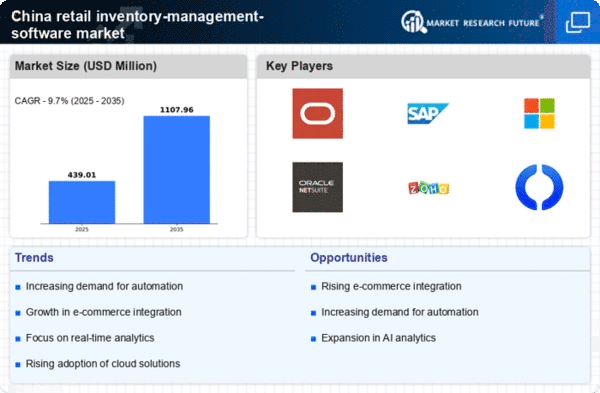Rising E-commerce Demand
The retail inventory-management-software market in China is experiencing a surge due to the increasing demand for e-commerce solutions. As online shopping continues to gain traction, retailers are compelled to adopt sophisticated inventory management systems to streamline operations. In 2025, e-commerce sales in China are projected to reach approximately $2 trillion, necessitating efficient inventory management to meet consumer expectations. This trend drives the need for software that can integrate seamlessly with e-commerce platforms, ensuring real-time inventory tracking and management. Consequently, the retail inventory-management-software market is likely to expand as businesses seek to enhance their operational efficiency and customer satisfaction.
Focus on Sustainability Practices
Sustainability is becoming a pivotal concern for retailers in China, influencing the retail inventory-management-software market. As consumers increasingly prefer eco-friendly products, retailers are adopting sustainable practices, which necessitate efficient inventory management. Software solutions that enable better forecasting and waste reduction are in high demand. In 2025, it is projected that sustainable retail practices could enhance profitability by up to 20%. This shift towards sustainability is likely to drive the adoption of inventory management software that supports environmentally friendly practices, thereby shaping the market landscape.
Regulatory Compliance and Standards
The retail inventory-management-software market in China is also driven by the need for compliance with various regulatory standards. As the government implements stricter regulations regarding inventory management and reporting, retailers are compelled to adopt software solutions that ensure compliance. This includes adhering to standards related to product traceability and safety. In 2025, it is estimated that compliance-related costs could account for up to 15% of operational expenses for retailers. Consequently, the demand for inventory management software that facilitates compliance is likely to increase, positioning it as a critical driver in the market.
Technological Advancements in Retail
Technological innovations are significantly influencing the retail inventory-management-software market in China. The introduction of advanced technologies such as IoT and blockchain is reshaping how retailers manage their inventory. IoT devices enable real-time tracking of stock levels, while blockchain technology enhances transparency and traceability in supply chains. As retailers increasingly adopt these technologies, the demand for sophisticated inventory management solutions is expected to rise. In 2025, the market for IoT in retail is anticipated to grow by over 30%, indicating a robust opportunity for inventory management software providers to cater to this evolving landscape.
Increased Competition Among Retailers
The retail inventory-management-software market in China is being propelled by heightened competition among retailers. As the market becomes saturated, businesses are seeking ways to differentiate themselves through improved inventory management. Efficient inventory systems can lead to reduced costs and enhanced customer service, which are crucial for maintaining a competitive edge. In 2025, it is expected that competition will intensify, with retailers investing more in technology to optimize their inventory processes. This competitive landscape is likely to drive the growth of the retail inventory-management-software market as companies strive to implement innovative solutions.
















